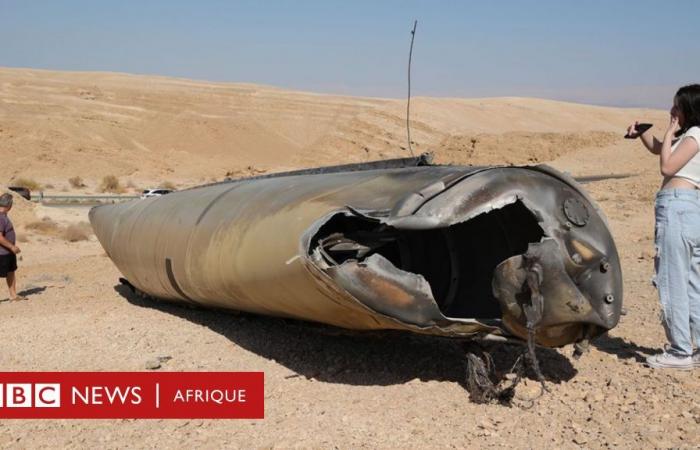
Photo credit, EPA
- Author, Frank Gardner
- Role, Security Correspondent, BBC News
-
7 hours ago
The Middle East region is once again on the brink of open and devastating war between two protagonists who have been at odds for most of the past 45 years. We are experiencing one of the most dangerous times for the entire region.
Iran, which became an Islamic republic after the fall of the Shah in 1979, has long been committed to destroying the state of Israel, which it calls the “Zionist regime.”
Israel accuses Iran’s Revolutionary Guard of spreading violence throughout the region through its allies, a view shared by the governments of several Arab countries.
And Israel is preparing to retaliate against Iran following Tuesday’s missile attack.
Iran said the measure was taken in response to two assassinations by Israel, that of the leader of the Lebanese Hezbollah militia, Hassan Nasrallah, in Beirut last Friday, and that of the Palestinian Hamas, Ismail Haniya, in Tehran last month. July.
What will happen now?
Israel and its close ally the United States have vowed to punish Iran for launching 180 missiles into Israeli territory.
According to Israeli Prime Minister Benjamin Netanyahu, “Iran will pay a high price”.
Requests for containment addressed to Israel by its allies last time during the escalation of tensions between the two powers last April did not materialize this time.
And given Israel’s determination to take on all its enemies at once, in Lebanon, Gaza, Yemen and Syria, Netanyahu’s government does not seem up to the task.
Israeli military strategists are likely already debating whether and how to retaliate against Iran.
Photo credit, Getty Images
Where Israel could strike
With the help of U.S. satellites and Israel’s foreign intelligence service, Mossad, Israeli agents on the ground in Iran have a wide range of potential targets to choose from. They can be divided into three categories:
- Military – An obvious first target would be the bases from which Iran launched its ballistic missiles against Israel, its launch platforms, its command and control centers, its fuel depots and its storage silos. The Israelis could go further and attack Revolutionary Guard bases as well as air defenses and other missile batteries. They might even try to kill those directly involved in Tuesday’s attack.
- Economic – This would include the Iranian state’s most vulnerable assets, such as its petrochemical plants, generators and perhaps also its maritime infrastructure. This option would be extremely unpopular in Iran, as it would end up harming ordinary citizens far more than an attack targeting military targets.
- Nuclear – This would be the big gamble for Israel. It is a known fact, confirmed by the International Atomic Energy Agency, that Iran is enriching uranium well beyond the 20% required for civilian use of nuclear energy. The Israelis, like other governments, suspect Tehran of trying to reach the “critical point” at which it would be very close to being able to build a nuclear bomb. Possible targets for such an attack would be Parchin, the center of Iran’s military nuclear program, Tehran’s experimental reactors, Bonab and Ramsar, as well as large facilities such as Bushehr, Natanz, Isfahan and Ferdows.
Photo credit, Getty Images
Much of the Israeli calculus will be guessing what the Iranian response might be and trying to mitigate it.
Iran’s position is that with the missiles launched on Tuesday, scores have been settled with Israel, but it has warned that if it retaliates, Iran will do so as well.
Iranian President Massoud Pezeshkian said after Tuesday’s attack: “This is just a glimpse of our capabilities.”
The Revolutionary Guards emphasized the message: “If the Zionist regime responds to Iran’s operations, it will face devastating attacks. »
Iran cannot defeat Israel militarily. Its air force is obsolete and decrepit, and its air defense is cracked and hobbled by years of Western sanctions.
But it still has huge numbers of ballistic missiles and explosive-laden drones, as well as numerous allied militias throughout the Middle East.
Its next barrage of missiles may well target residential areas of Israel rather than military bases.
The attack by an Iranian-backed armed group on Saudi oil facilities in 2019 showed how vulnerable its neighbors are to Iranian attacks.
The Revolutionary Guard naval forces, operating in the Persian Gulf, have small attack flotillas that could defeat the defenses of a U.S. Fifth Fleet ship if launched in a swarm.
If given the orders, they could exploit the Strait of Hormuz, disrupting the flow of up to 20% of global oil exports, which would have a major impact on the global economy.
And then there are all the bases that the United States has scattered throughout the Arab part of the Gulf, from Kuwait to Oman.
Iran has warned that if it is attacked, it will not only turn on Israel, but will target any country it considers to have supported the attack.
These are just some of the scenarios that defense officials in Tel Aviv and Washington must now consider.





